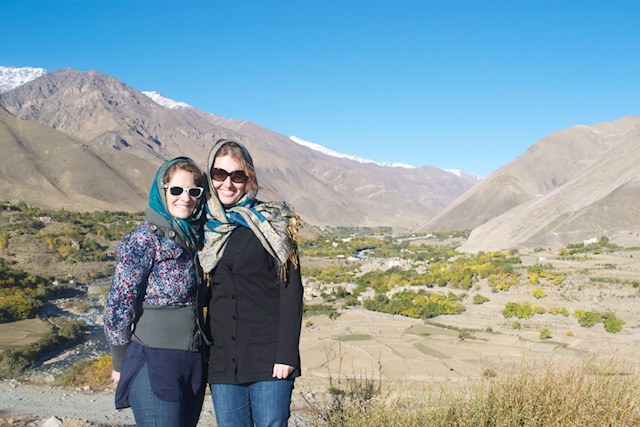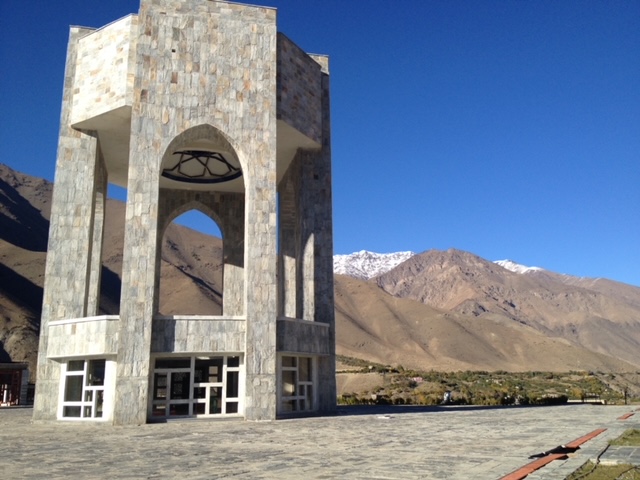When your Rotary program is superseded by the world’s top news story, you make a few changes. Hadley Rose Staley has lived and worked in several of the world’s current and former hot spots. When she agreed to give a program to the Rotary Club of the San Juan Islands, Rose Staley chose to highlight her experiences living and teaching law in Afghanistan in 2013 and 2014. World events dictated otherwise when the selected program date was August 25, the middle of the US-led evacuations after the fall of Kabul. Club President Pete Rose (father of the presenter), gave Hadley free rein to leave as much of the program on the cutting room floor as needed, to jot down five or ten points, and “riff” from there. Most was cut and replaced on the fly. The rest was filled in by insightful questions from an engaged membership. The program ran overtime and provided the kind of deep thinking that sets Rotary apart.

Panjshir Valley, Hadley (on the left) and a friend are pictured here.
To begin with, Rose Staley gave a synopsis of her relevant background, which included a JD from Willamette University and a Masters in Law from Yale. She served a two-year contract in Rwanda’s Ministry of Justice, writing legislation in English, one of Rwanda’s three official languages (the others being Kinyarwanda and French). Hadley speaks all three, some more fluently than others. She also spent some time as an attorney on the ground for a legal team representing a group of Khmer Rouge victims in Cambodia on the first two Khmer Rouge trials. Working in two genocide-afflicted countries led to a published law review article on legislative responses to genocide, specifically in hate speech legislation. Her first role in Afghanistan was at the American University, where she was Chair of the Law Department and Assistant Professor of Law. Hadley was at least 10 years younger than other department heads, and one of a small group of women in leadership roles. Indeed, many of the law students were older than her. From that, she transitioned to the role of Executive Director of the Friends of the Public-Private Partnership for Justice Reform in Afghanistan, which provides scholarships for Afghan lawyers to get their Masters of Law at prestigious US law schools. The concept was to embed democracy by giving a foundation in the rule of law through critical legal thinking and analysis skills, taught at US law schools.

Memorial structure in the Panjshir Valley
Though there was occasional extremist activity in her neighborhood, Hadley reported feeling relatively safe during her time in Afghanistan in 2013-2014, but would not feel safe now. There was little of the experiential sightseeing one would do in a new country, and trying to keep a low profile was important to the feeling of safety. After leaving the American University, she returned a few other times as part of the process to select law students for the FPJRA scholarship program. She has not been back since early 2020.
One of the first Rotary member questions was about Sharia Law and the risks to women and girls. In responding, Rose Staley staked her ground as a thoughtful pragmatist. She expressed the obvious fear for the female population, but placed responsibility where it belonged. The country’s constitution protected women’s rights at the same time as it identified Sharia as the main source of law in Afghanistan. In fact, Sharia has only 7 distinct crimes, several of which are uncontroversial. She explained that the most troubling Sharia crimes have such high evidentiary requirements that it is hard to believe they could ever rightfully be prosecuted. For example, the crime of adultery (zina) requires 4 male eyewitnesses to the act of adultery to trigger the famous stoning penalty. Afghanistan’s experience with implementing this Sharia crime was normally that a lesser or ordinary crime from the criminal code would apply to a situation rather than the Sharia penalty, which could not be justified without the 4 eyewitnesses. The problem is when enforcement is withreligious extremists and without courts of law, which could very well be the case under Taliban control.
The broader perspective led to the point that the people in general and women in particular have spent the 20 years getting educated and women have held many elected and appointed positions in government and the courts, including as judges, Members of Parliament, and Presidential appointees. She thought “brain drain” among those who got out and high risk of violence, forced marriage, and oppression for those who didn’t were valid concerns.
Rose Staley was asked whether the Internet age may make things different than 20 years ago. She noted that, living in Kabul, she had good internet and phone service most of the time, although connectivity was affected by critical failures in the power grid and frequent rolling blackouts. Connectivity will be a factor as most ordinary citizens and extremists now have cell phones, but only a subset has smart phones and has the budget to be able to use them to access the internet. Her own cell-phone access to Afghans underscored the point that these last-days efforts were destined to leave people behind due to the difficulty getting to and into the airport. The listener could tell these circumstances were disheartening to Rose Staley.
Quizzed about overland routes of escape, she noted the possibility, but the longest border was with Pakistan and those fleeing must pass through many checkpoints and enter the most lawless portion of Pakistan. This raises the specter of another long-lasting land migration of displaced populations as is now occurring in many parts of the world.
There was a brief side trip into the perspective of the quick city-by-city, province-by-province fall of the country. Rose Staley noted that the country is tribal and has different languages, dialects, and local leadership. Given a 2020 negotiation directly between the Taliban and US, local leaders could see the writing on the wall and made their best deal without taking unnecessary casualties, but also without standing up for their people’s lives and freedom.
Another question covered whether university students could transfer to another American University campus in the Middle East. Hadley was skeptical, finding them to be loosely affiliated schools rather than fitting the model of branch campuses. It raised the further issue of whether the Taliban will allow anyone to leave for education. However, she was aware of many efforts being made in this regard to help current and former students of the American University to leave the country and continue their studies
This comes full circle back to her current position with the NGO. At the time of the program, Hadley was spending 10-12 hours a day on the phone listening to pleas from former and current students (plus desperate strangers), and trying to get the attention of US government officials for these critically at-risk groups. She is not sure whether any of her calls were effective. While some of her high-risk students and alums got out, most, including those who qualified for Special Immigrant Visas due to service to US-government funded projects, were left behind and she is still working on their safe evacuation. It calls for an achingly philosophical view of a difficult outcome for those who do not get out. Those left behind comprise a core group of intelligent, US-educated Afghan lawyers to continue to play a role in the future Afghanistan while fearing for their lives due to their beliefs in free expression and critical thinking.
